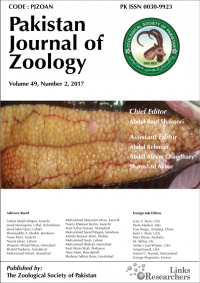Diagnosis of Canine Multicentric Lymphoma in Dog
Diagnosis of Canine Multicentric Lymphoma in Dog
Yuan Zhang1, Qingyue Han1, Peiquan Du1, Yi Lu1, Lianmei Hu1, Sadaqat Ali2, Khalid Mehmood2, Sajid Hameed2, Zhaoxin Tang1, Hui Zhang1* and Ying Li1*
ABSTRACT
A 10-year-old female unsterilized Chinese rural dog was found to have a lump in the groin area over the past two months. The dog visited the doctor due to inguinal mass, loss of appetite, dyspnea, fever, and other symptoms. Blood routine examination displayed declined MCV and lymphocytes, while augmentation of neutrophils. Serum biochemistry, SNAP cPL and blood gas analysis suggested that the dog have pancreatitis and chronic compensatory alkalosis. The X-ray examination revealed pleural effusion of the dog; B-ultrasound showed nodular lesions in the spleen and enlarged lymph nodes in the abdominal cavity. Subsequent cytological examination of smear made from lymph node FNA and peritoneal fluid revealed a large number of lymphoblasts. The above symptoms could be combined to make a preliminary diagnosis of lymphoma in dogs. To further determine the type of lymphoma, the H and E, and immunohistochemistry were done. The immunohistochemical test exposed the immunophenotype positive for CD79a. Finally, B-cell (CD79a) polycentric lymphoma was confirmed. This case report introduces the diagnostic methods of IHC and immunohistochemistry, rarely used in the diagnosis of lymphoma in clinical practice in China, which can provide a reference for veterinarians in clinical diagnosis.
To share on other social networks, click on any share button. What are these?










